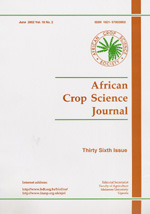
|
African Crop Science Journal
African Crop Science Society
ISSN: 1021-9730
EISSN: 1021-9730
Vol. 20, No. 3, 2012, pp. 197-205
|
 Bioline Code: cs12035
Bioline Code: cs12035
Full paper language: English
Document type: Research Article
Document available free of charge
|
|
|
African Crop Science Journal, Vol. 20, No. 3, 2012, pp. 197-205
| fr |
SIMWAKA,KISU; FERRER,S. & HARRIS,G.
Résumé
Le gouvernement de Malawi a plusieurs fois tenté d'augmenter la productivité des systèmes agricoles dans le
pays. Cependant, l'impact de cet effort dans le contexte de l'épidémie du VIH/SIDA n'a pas été abordé. Cet
article examine les niveaux de l'efficacité des ménages de petits fermiers affectés et non affectés au Malawi. Les
modèles de production du Time-variant and invariant inefficiency étaient utilisés. Les résultats montrent que les
niveaux d'efficacité technique de ménages non affectésétaient plus élevés que ceux des ménages affectés. En
général, les fermiers malawites sont techniquement efficients, impliquant que la politique gouvernementale en
matière de subsides des semences hybrides de maïs et fertilisants depuis la saison culturale Juin 2006 a amélioré
l'efficience technique des petits fermiers. Néanmoins, il n'avait aucune possibilité d'amélioration de la productivité
comme c'est le cas de quelques ménages des fermiers, particulièrementles femmes responsables des ménages
affectés par la mortalité de leurs partenaires, avec des niveaux bas d'efficience. Deux problèmes liés à la politique
agricole ont été évoqués dans cette étude : d'une part, tous les obstacles limitant l'usage des intrants agricoles
devront être enrayés. Ceci implique une complète libéralisation d'achat et distribution d'intrants et le développement
des technologies moins chères afin de réduire les contraintes de la main d'oeuvre. D'autre part, il est impérieux de
développer le capital social dans les petites exploitations par la création des clubs des fermiers, ou par établissent
des coopératives agricoles.
Mots Clés
Fertilisants, capital social, subside, efficience technique>
|
| |
| en |
TECHNICAL EFFICIENCY DIFFERENTIALS AMONG HIV/AIDS AFFECTED FARM HOUSEHOLDS IN MALAWI: EVIDENCE FROM TIME VARIANT AND INVARIANT INEFFICIENCY MODELS
SIMWAKA,KISU; FERRER,S. & HARRIS,G.
Abstract
The Malawi Government has made various attempts to raise the productivity of the agricultural systems in the
country. However, the impact of this effort within the context of HIV/AIDS epidemic has not been investigated.
This paper examines the levels of efficiency for affected and non-affected small-scale farm households in Malawi.
Time-variant and invariant inefficiency models of production were used. Results show that the technical efficiency
levels for non-affected households were higher than those of the affected households. In general, Malawian
farmers are technically efficient, implying that government policy of subsidising hybrid maize seeds and fertilisers
since the 2006/06 agricultural season enhanced technical efficiency of small-scale farmers. Nevertheless, there
was more scope for improvement of the productivity as some farm households, particularly affected female
headed households that had cases of mortality of a prime adult member, were still operating at low levels of
efficiency. Two main policy issues emerge from this study. First, all types of obstacles that could limit the use of
farm inputs should be removed. This should include complete liberalisation of purchase and distribution of such
inputs and the development of some low-cost technology to reduce labour constraints on the farm. Second, there
is need to develop social capital in smallholder farming through the recommencement of farmers' clubs, or by
setting up agricultural cooperatives.
Keywords
Fertilisers, social capital, subsidiary, technical efficiency>
|
| |
© Copyright 2012 - African Crop Science Journal
|
|
